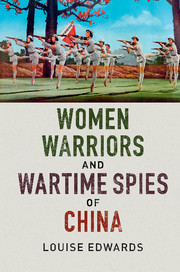Book contents
- Frontmatter
- Dedication
- Contents
- List of Figures
- Acknowledgements
- Chronology
- 1 Soldiering, war and gender in China
- 2 The archetypal woman warrior, Hua Mulan: Militarising filial piety
- 3 Qiu Jin: Transitioning from traditional swordswoman to feminist warrior
- 4 Xie Bingying opening public spaces to women Fighting patriarchy and fighting militarists
- 5 Aisin Gioro Xianyu: ‘Joan of Arc of the Orient’ or ‘Mata Hari of the East’?
- 6 Guerrilla resistance leader, Zhao Yiman: Warrior teacher and self-sacrificing CCP mother
- 7 Negotiating sexual virtue: The glamorous, honey-trap spy, Zheng Pingru
- 8 Ding Ling and Zhenzhen: Female chastity and good communist governance
- 9 Mobilising and militarising rural China through the girl martyr, Liu Hulan
- 10 Women warriors and wartime spies as tools for ‘total militarisation’: The Red Detachment of Women
- Notes
- Bibliography
- Index
2 - The archetypal woman warrior, Hua Mulan: Militarising filial piety
Published online by Cambridge University Press: 05 March 2016
- Frontmatter
- Dedication
- Contents
- List of Figures
- Acknowledgements
- Chronology
- 1 Soldiering, war and gender in China
- 2 The archetypal woman warrior, Hua Mulan: Militarising filial piety
- 3 Qiu Jin: Transitioning from traditional swordswoman to feminist warrior
- 4 Xie Bingying opening public spaces to women Fighting patriarchy and fighting militarists
- 5 Aisin Gioro Xianyu: ‘Joan of Arc of the Orient’ or ‘Mata Hari of the East’?
- 6 Guerrilla resistance leader, Zhao Yiman: Warrior teacher and self-sacrificing CCP mother
- 7 Negotiating sexual virtue: The glamorous, honey-trap spy, Zheng Pingru
- 8 Ding Ling and Zhenzhen: Female chastity and good communist governance
- 9 Mobilising and militarising rural China through the girl martyr, Liu Hulan
- 10 Women warriors and wartime spies as tools for ‘total militarisation’: The Red Detachment of Women
- Notes
- Bibliography
- Index
Summary
Hua Mulan has entranced and intrigued generations of Chinese. Since the Northern Wei dynasty (386–534) stories of her remarkable adventures in the military realm, replacing her father in the imperial troops disguised as a man, have been a recurring theme in both elite and popular cultural forms, including poetry, drama, opera and more recently film, television series and video games. Mulan's continued popularity over 1,500 years, in part, can be credited to the flexibility of her story and its redactors’ enthusiasm to make adjustments to the plot line and narrative resolution. The various evolving renditions of her story inevitably illuminate the concerns of writers in specific historical and ideological contexts as well as their diverse artistic goals and commercial interests. As Wu Pei-Yi aptly put it, ‘She was, and still is, amenable to all forms of fantasizing and manipulation.
Over the centuries critics have identified a wide range of often-contradictory perspectives on the central significance of the Mulan story – from filial piety and feminism, to maidenly chastity and militarism, onwards through Marxism and patriotism. Distinct consistencies underpin this apparently paradoxical list and these reveal how the many women warriors of China's rich cultural heritage buttressed, rather than challenged, the existing social order. The presumed nascent feminism of China's iconic women warriors is counterbalanced by their stories’ role in reinforcing a male-dominated and masculinist gender order. While figures like Hua Mulan did inspire real women to take on new and different social roles – feminists in the early twentieth century explicitly invoked Mulan – the overarching narrative framing China's traditional women warriors consolidated rather than disrupted the status quo patriarchy. Mulan's story embeds militarisation into the core virtue of filial piety – respect for and obedience to one's parents and seniors. And, as we will see in the discussion of the twentieth-century renditions of her story, she is harnessed to promote ‘militarised filial piety’ as the modern social virtues of patriotism and sacrifice to the nation-state. Hua Mulan is ‘grandmother’ to all the later women warriors discussed in this book.The retelling of her story across multiple media in the twentieth century set the tone for popular culture and propaganda that used women warriors to promote the militaristic ideologies that support China's war system.
- Type
- Chapter
- Information
- Women Warriors and Wartime Spies of China , pp. 17 - 39Publisher: Cambridge University PressPrint publication year: 2016



